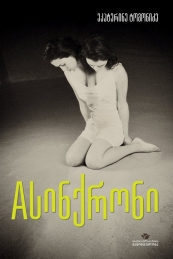ASYNCHRONY
‘Ekaterine Togonidze has a niche of her own in literature: hitherto, the themes she elaborates have been virtually entirely ignored by Georgian literature.’
Lasha Bugadze, author, playwright, 2013
EXTRACT
Translated into English by Natalia Bukia-Peters and Charlotte Marsden
So now no longer am I the one doing it, but sin which dwells in me.
Paul’s Epistle to the Romans, 7:17
Part One
The postman was ringing the doorbell when Rostom arrived home.
‘Oh, you’re back, are you? I was about to leave,’ he said as Rostom came out of the lift. He asked him to sign for a letter and went down the stairs.
The letter was from the hospital. He glanced through it. “Concerning expenses incurred by your children… Payment is compulsory…’
He stopped reading. He didn’t have any children. He turned the paper over and read the last sentence: “Our sincere condolences…”
‘What the hell’s this about?’ he muttered, looking down the stairwell. The postman was nowhere to be seen.
Indoors, clothes lay on the chairs in dusty heaps. His shelves were stuffed with tatty books; in the squalid kitchen, dirty cups without handles and chipped plates were piled high. A large black-and-white photo of his mother hung on the wall. Rostom went to put the letter down on a shelf, but instead chucked it in the bin. He switched on the TV and put a pan of leftover fried potatoes from the day before on the cooker. On the news there was something about a circus that was closing down.
He took a bottle of sauce out of the fridge and poured some vodka into a glass. The words ‘funeral expenses for your children’ drifted back to him from the letter. He looked up at his mother’s photo and shook his head. She gazed down at him with her sad eyes... or so it seemed to Rostom. Whenever the thought of selling the house crossed his mind, he avoided meeting her eye. He didn’t dare take it down. He was ashamed even to think of taking her picture down.... (See PDF)
In case of using the information, please, indicate the source.
